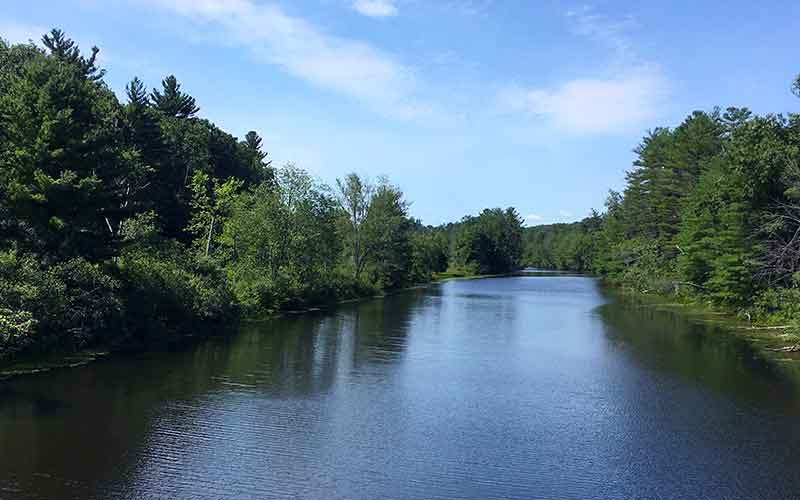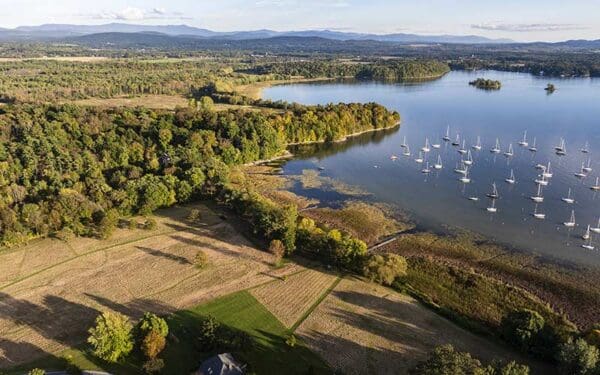
The Nashua River was once one of the most polluted waterways in the country. Massive new residential and commercial development in Devens, Massachusetts, could put the river's ongoing recovery at risk.
For 79 years, Fort Devens served as a major U.S. Army hub in north-central Massachusetts. When the fort closed in the mid-1990s, the Commonwealth decided to transform the rural base, which was predominantly quiet forest land, into a massive development of residential and commercial sprawl. The State purchased the majority of the fort and embarked on an effort to essentially create a new community.
Today, Devens advertises itself as an award-winning model for military base reuse. The Devens website is replete with examples of “greenness,” including the Devens Eco-Efficiency Center, “which helps organizations reduce environmental impacts and operating costs.” The site also shows happy families boating and fishing along the Nashua River, which runs through the area.
But don’t be fooled. Devens has failed to take some of the most basic steps to truly be environmentally friendly – and its failures are threatening the fragile health of the Nashua River.
That’s why CLF has announced a lawsuit against MassDevelopment Authority and the Devens Enterprise Commission, redevelopers of the old fort property, for violations of the Clean Water Act. Through this suit, CLF is helping to ensure that future development at the site follows the law and protects the health of people and the environment.
Devens is Breaking the Law and Harming Local Waters
Like any other community in the Commonwealth with its own stormwater sewer system, Devens is required to follow the Clean Water Act by obtaining and complying with a Clean Water Permit. This permit addresses the issue of harmful stormwater discharges into public waterbodies.
Stormwater pollution is the biggest threat to clean water in New England. When rain and snowmelt gush over roads, parking lots, and other paved surfaces, they pick up pollutants like pathogens, debris, pesticides, and toxic metals. That contaminated soup of dirty water then pours into our waterways.
Devens still boasts woodlands and fields today, but if MassDevelopment is successful, then the former army base will continue to fill with industrial facilities, office complexes, residential neighborhoods, and retail stores – along with the acres of flat roofs, roads, and parking lots that go with them. This development will only increase the amount of polluted stormwater reaching the Nashua River
The stormwater permit that Devens needs – called the Small MS4 Permit – requires Devens to take six minimum steps to address the water pollution it is already discharging and will discharge in the future. The permit also requires Devens to report its pollution to the EPA. This, in turn, helps scientists and government officials keep track of the health of the Nashua River.
But Devens has not even applied for, let alone complied with, the Clean Water Act stormwater permit. This failure has put the Nashua River and its tributaries at risk.
Water, Wildlife, and More at Risk
The Nashua River is historically one of the most polluted rivers in the nation. In the late 1960s, the water was so dirty that the only life it supported was sludge worms. The river has been getting better, but it is still polluted and remains on the list of “impaired or threatened” waters maintained by the Commonwealth and the EPA. That means that water tests have found excessive levels of pesticides, E. coli, phosphorus, and other toxins that harm wildlife and can prevent the public from being able to fish, boat, or otherwise enjoy the river.
That’s right – despite frequently advertising recreation on the Nashua River as one of its amenities, Devens is not taking the most basic steps to protect this historic waterway.
Stormwater pollution threatens the recovery of the Nashua River. By complying with the Clean Water Act, Devens can show its commitment to this iconic river’s restoration – or it can continue to ignore the law and do more harm.
A Missed Opportunity
Devens is missing out on the opportunity to truly be the innovative new development it advertises. How often do we get to plan a community from scratch, especially here in historic Massachusetts? Devens is the perfect chance to build a community with environmental protection and public health in mind from the start.
At a minimum, Devens must comply with federal law by applying for a stormwater permit and implementing an effective program to control the stormwater pollution from the massive development plan now unfolding.
CLF is suing Devens to secure the health of New England’s waters and communities. We are working to ensure that Devens follows through with its legal requirements to monitor and prevent pollution. And we are making sure that Devens lives up to its own advertising and does not miss out on the opportunity to be a true model for new development.



